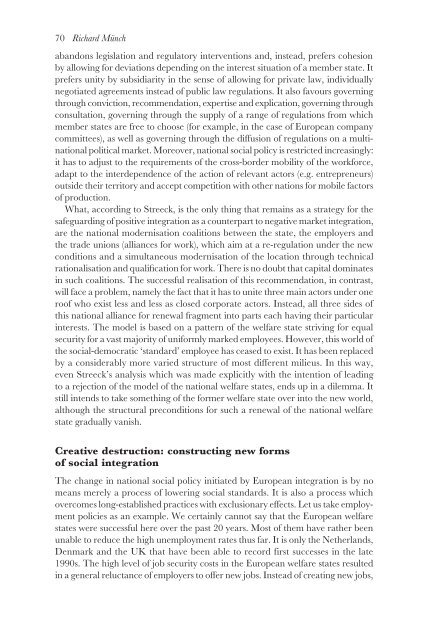Europeanisation, National Identities and Migration ... - europeanization
Europeanisation, National Identities and Migration ... - europeanization
Europeanisation, National Identities and Migration ... - europeanization
Create successful ePaper yourself
Turn your PDF publications into a flip-book with our unique Google optimized e-Paper software.
70 Richard Münch<br />
ab<strong>and</strong>ons legislation <strong>and</strong> regulatory interventions <strong>and</strong>, instead, prefers cohesion<br />
by allowing for deviations depending on the interest situation of a member state. It<br />
prefers unity by subsidiarity in the sense of allowing for private law, individually<br />
negotiated agreements instead of public law regulations. It also favours governing<br />
through conviction, recommendation, expertise <strong>and</strong> explication, governing through<br />
consultation, governing through the supply of a range of regulations from which<br />
member states are free to choose (for example, in the case of European company<br />
committees), as well as governing through the diffusion of regulations on a multinational<br />
political market. Moreover, national social policy is restricted increasingly:<br />
it has to adjust to the requirements of the cross-border mobility of the workforce,<br />
adapt to the interdependence of the action of relevant actors (e.g. entrepreneurs)<br />
outside their territory <strong>and</strong> accept competition with other nations for mobile factors<br />
of production.<br />
What, according to Streeck, is the only thing that remains as a strategy for the<br />
safeguarding of positive integration as a counterpart to negative market integration,<br />
are the national modernisation coalitions between the state, the employers <strong>and</strong><br />
the trade unions (alliances for work), which aim at a re-regulation under the new<br />
conditions <strong>and</strong> a simultaneous modernisation of the location through technical<br />
rationalisation <strong>and</strong> qualification for work. There is no doubt that capital dominates<br />
in such coalitions. The successful realisation of this recommendation, in contrast,<br />
will face a problem, namely the fact that it has to unite three main actors under one<br />
roof who exist less <strong>and</strong> less as closed corporate actors. Instead, all three sides of<br />
this national alliance for renewal fragment into parts each having their particular<br />
interests. The model is based on a pattern of the welfare state striving for equal<br />
security for a vast majority of uniformly marked employees. However, this world of<br />
the social-democratic ‘st<strong>and</strong>ard’ employee has ceased to exist. It has been replaced<br />
by a considerably more varied structure of most different milieus. In this way,<br />
even Streeck’s analysis which was made explicitly with the intention of leading<br />
to a rejection of the model of the national welfare states, ends up in a dilemma. It<br />
still intends to take something of the former welfare state over into the new world,<br />
although the structural preconditions for such a renewal of the national welfare<br />
state gradually vanish.<br />
Creative destruction: constructing new forms<br />
of social integration<br />
The change in national social policy initiated by European integration is by no<br />
means merely a process of lowering social st<strong>and</strong>ards. It is also a process which<br />
overcomes long-established practices with exclusionary effects. Let us take employment<br />
policies as an example. We certainly cannot say that the European welfare<br />
states were successful here over the past 20 years. Most of them have rather been<br />
unable to reduce the high unemployment rates thus far. It is only the Netherl<strong>and</strong>s,<br />
Denmark <strong>and</strong> the UK that have been able to record first successes in the late<br />
1990s. The high level of job security costs in the European welfare states resulted<br />
in a general reluctance of employers to offer new jobs. Instead of creating new jobs,



